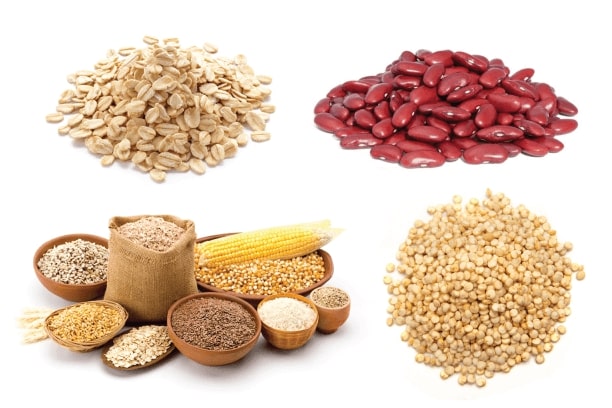


Carbohydrates are an essential macronutrient that provides the body with energy, particularly for the brain and muscles. However, not all carbs are the same. Some, found in processed foods like sugary snacks and refined grains, can harm health, leading to weight gain and chronic diseases such as diabetes and heart disease.
On the other hand, carbohydrates from whole foods like fruits, vegetables, whole grains, and legumes are nutrient-dense and offer numerous health benefits. These healthy carbs provide fiber, vitamins, and minerals that support digestion, control blood sugar, and promote heart health.
By focusing on whole food carbs, you can enjoy sustained energy and reduce the risk of chronic health issues. Here are 12 high-carb foods that are incredibly healthy and beneficial for your health.
Sweet potatoes are a nutrient-dense root vegetable that is high in complex carbohydrates, fiber, and essential vitamins such as A and C. These vitamins are vital for boosting immunity, promoting healthy skin, and maintaining eye health.
In addition to these benefits, sweet potatoes are rich in antioxidants that help fight inflammation and improve overall health. Their high fiber content aids in digestion, stabilizes blood sugar levels, and supports heart health.
Sweet potatoes can be baked, roasted, or mashed, making them an incredibly versatile food. They are a delicious and nutritious addition to any meal, whether as a side dish, in soups, or as part of a salad.
Oats are a whole grain that is high in complex carbohydrates, fiber, and protein, making them an excellent option for maintaining energy levels throughout the day.
They are also a good source of essential vitamins and minerals, including iron, zinc, and B vitamins, which are important for overall health and wellness. The high fiber content in oats helps regulate blood sugar levels, improve digestion, and lower cholesterol.
Oats are a versatile food that can be enjoyed in many different ways. Whether consumed as oatmeal, in baked goods, or as a topping for yogurt or fruit, oats provide a satisfying and nutritious option for any meal.
Bananas are a high-carb fruit that is rich in fiber, vitamins, and essential minerals, including potassium and vitamin C. Potassium is important for maintaining healthy blood pressure and supporting proper muscle and nerve function. Bananas are also a good source of antioxidants, which can help reduce oxidative stress and protect against chronic diseases.
Additionally, bananas have been shown to improve digestive health and aid in weight loss due to their high fiber content. Bananas are a convenient and portable snack that can be eaten on their own, or they can be added to smoothies, baked goods, or used as a topping for oatmeal or yogurt.
Brown rice is a whole grain that is high in complex carbohydrates, fiber, and B vitamins. The fiber in brown rice promotes healthy digestion, helps control blood sugar levels, and supports weight management.
It is also a good source of minerals such as magnesium and selenium, which play a crucial role in maintaining healthy bones and a strong immune system.
Unlike white rice, brown rice retains its nutrient-rich bran and germ, making it a healthier option.
Brown rice can be used as a base for stir-fries, salads, or as a nutritious side dish, providing a satisfying and healthy alternative to refined grains.
Lentils are a high-protein legume that is also packed with complex carbohydrates and fiber. These nutrients help support muscle growth, maintain healthy energy levels, and improve digestive health.
Lentils are a rich source of essential vitamins and minerals, including iron, folate, and magnesium, which are important for cardiovascular health, immune function, and energy production. Lentils are a versatile ingredient that can be used in a variety of dishes, including soups, stews, salads, and as a meat substitute in many vegetarian and vegan recipes.
They are not only delicious but also provide a plant-based source of protein and fiber.
Quinoa is a gluten-free grain that is high in protein, complex carbohydrates, and fiber, making it an ideal choice for anyone looking to maintain a balanced diet.
Unlike many other grains, quinoa is a complete protein, containing all nine essential amino acids required for tissue repair and muscle growth.
It is also a rich source of vitamins and minerals, including magnesium, phosphorus, and iron, which are essential for bone health, energy production, and oxygen transport in the body.
Quinoa can be used as a substitute for rice or pasta, or as a base for salads, grain bowls, and other nutritious dishes.
Apples are a high-fiber fruit that is also rich in complex carbohydrates, essential vitamins, and minerals, including vitamin C and potassium. The fiber in apples helps improve digestion, regulate blood sugar levels, and maintain a healthy weight.
Apples are also a good source of antioxidants, such as flavonoids, which help protect the body from free radical damage and reduce the risk of chronic diseases.
They have been shown to improve heart health by lowering cholesterol and supporting blood circulation. Apples are versatile and can be eaten on their own, or they can be added to salads, smoothies, or baked goods, providing a refreshing and healthy snack option.
Chickpeas, also known as garbanzo beans, are a high-protein legume that is rich in complex carbohydrates and fiber. This combination helps provide long-lasting energy and supports healthy digestion.
Chickpeas are an excellent source of essential vitamins and minerals, including iron, zinc, and folate, which are important for immune function, red blood cell production, and overall health.
Chickpeas are a versatile ingredient that can be used in a variety of dishes, from hummus to salads, soups, and stews. They also make a great meat substitute in many vegetarian and vegan recipes, providing a healthy, plant-based protein option.
Beets are a root vegetable that is high in complex carbohydrates, fiber, and essential vitamins and minerals, including folate, manganese, and vitamin C. The high fiber content in beets supports healthy digestion and helps regulate blood sugar levels.
Beets are also a rich source of antioxidants, including betalains, which have been shown to reduce inflammation and protect against chronic diseases such as heart disease and cancer.
The natural nitrates in beets have been shown to improve exercise performance and lower blood pressure. Beets can be roasted, boiled, or shredded and added to salads, soups, or as a side dish for a nutritious and flavorful meal.
Buckwheat is a gluten-free whole grain that is high in complex carbohydrates, fiber, and protein. It is also a good source of essential vitamins and minerals, including magnesium, phosphorus, and B vitamins, which are vital for energy production, bone health, and overall well-being.
Unlike wheat, buckwheat is not a true cereal grain and is suitable for those with gluten intolerance. Buckwheat is a versatile food that can be used in place of rice or quinoa, or added to pancakes, baked goods, or salads.
Its nutty flavor and nutrient-rich profile make it a healthy addition to a variety of dishes.